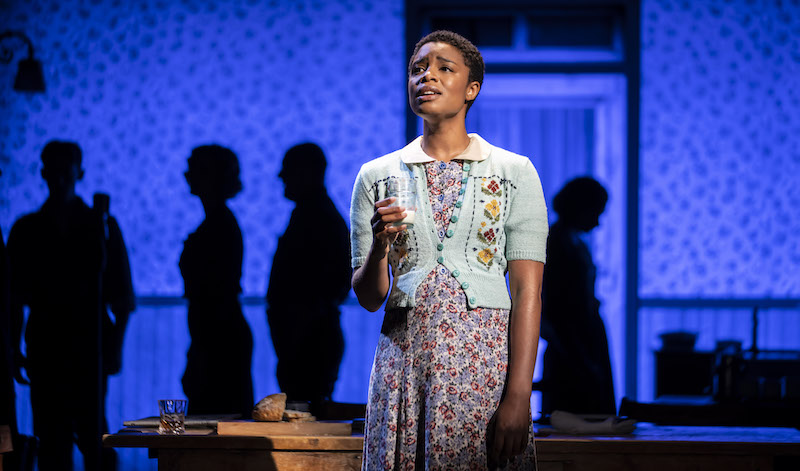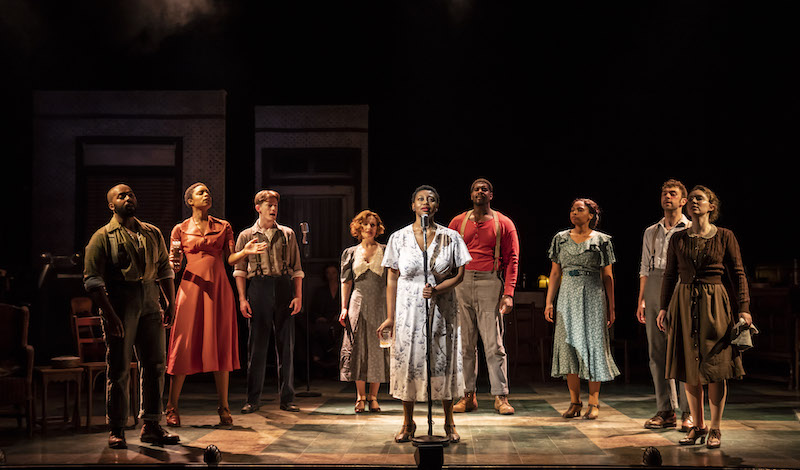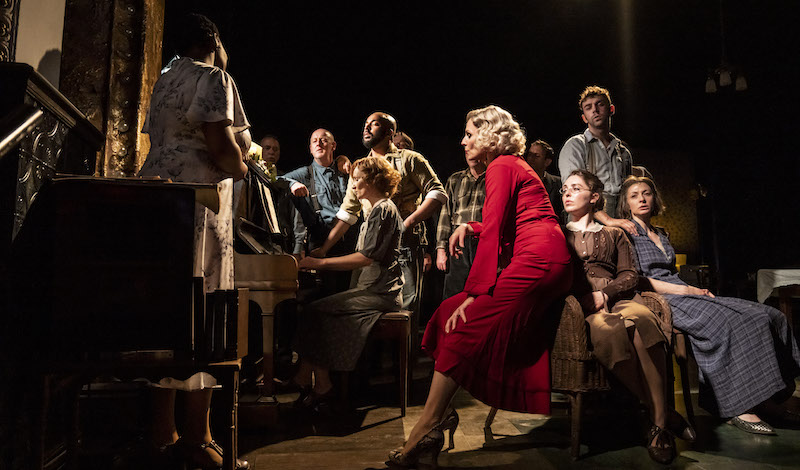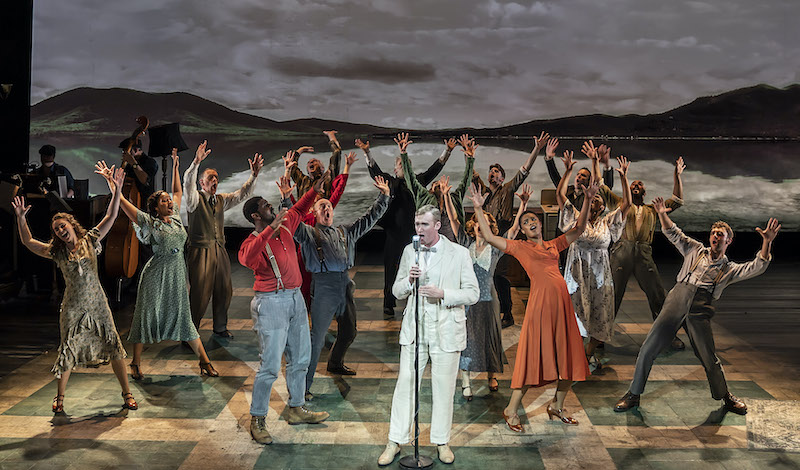Girl from the North Country
★★★★☆ Organic
Playhouse: Tue 18 – Sat 22 Oct 2022
Review by Hugh Simpson
Possessing theatrical craft and endless soul, Girl from The North Country is in danger of giving touring jukebox musicals a good name.
The work of Bob Dylan has become part of the cultural landscape; even if you don’t agree with his Nobel Prize For Literature, denying the breadth of his achievement would be short-sighted. There is also a timelessness to much of his work. This means that a musical featuring his songs set in his hometown of Duluth, Minnesota – before he was even born – is thoroughly appropriate.
The 1934 setting also seems fitting in the light of Dylan’s youthful Woody Guthrie obsession, and allows writer-director Conor McPherson much scope to indulge his love of the American tradition.
A broken-down guest house run by Nick Laine (the suitably downbeat Colin Connor) and his family, features a selection of depression-era standbys. There is the downwardly-mobile businessman, the alcoholic would-be writer, the woman hoping against hope for an elusive legacy, the morphine-addicted doctor, and assorted chancers, hucksters, ne’er-do-wells, dreamers and human flotsam and jetsam.
There are echoes of Steinbeck, Wilder and O’Neill that are not always subtle, particularly in some framing exposition which is decidedly clunky, even when tinged with those elements of the otherworldly that MacPherson does so well.
big emotional moment
The thwarted dreams of the characters, meanwhile, are mirrored by an overly ambitious structure that tries to do more than is ever going to be possible. Characters are built up, have their big emotional moment, and simply disappear. Such a desire to be panoramic could be frustrating, but it is all done so organically, and with such heart, that it largely convinces.
Most musicals based on an artist’s existing catalogue rely on the most recognisable, crowd-pleasing numbers but it would be a very peculiar list of Dylan’s Top 20 that included Sign On The Window, I Went To See The Gypsy or True Love Tends To Forget.
This means that there are none of those are uncomfortable plot devices designed to shoehorn in a particular song. One exception is the introduction of a wrongly imprisoned boxer (the magnetic Joshua C Jackson), a sure sign that Hurricane is coming. Even then, we are wrong-footed by the song co-opting some of All Along the Watchtower, another of those things that isn’t entirely successful but is certainly intriguing.
When the most familiar songs do appear, they do so in unfamiliar guise. I Want You, a slowed-down duet between the feckless Hemingway wannabe Gene (Gregor Laine, impressing in his professional stage debut) and his lost love Kate (Eve Norris) is the most spine-tingling musical moment.
Like A Rolling Stone, stripped of its bile, becomes a heartfelt showstopper that verges on the overwrought, but is well served by some excellent work from movement director Lucy Hind and tremendously well performed by Frances McNamee as Elizabeth Laine.
breathtaking performance
McNamee’s performance crystallises those elements of this production that shouldn’t really work but succeed. Broken down mentally, subject to psychotic rages and moments of searing clarity, she appears to be suffering from some form of early-onset dementia but this, like so much of the backstory of the characters is left unexplained – despite the unsubtle exposition.
The character could come across as desperately unconvincing but there is a grace to the writing that is matched by McNamee’s honest, abandoned and breathtaking performance.
Many of the characters rely on their symbolic value; it would be polite to describe them as archetypes. However, the commitment of the huge ensemble, together with the elegance of the dialogue means that the audience becomes fully invested in the action.
It is all far less complicated than a simple outline of the story would suggest, which is a good reason not to explain it in any detail. The second half, in particular, verges on the impressionistic with the songs tending to add colour rather than advancing either plot or character.
It is impossible to namecheck all of the performers, but the singing of Keisha Amponsa Banson and Justina Kehinde is particularly noteworthy.
deep-rooted Americana
The effect of the music is greatly aided by the orchestrations of Simon Hale. The onstage band, with its bar-room piano, folky fiddle and loose-limbed bass, manages to evoke that deep-rooted Americana, mixing folk, country and gospel, that was the province of Dylan’s collaborators The Band.
McPherson’s direction is unfussy and makes great use of the huge numbers in the ensemble. Simon Baker’s sound is first rate, while Mark Henderson’s lighting is evocative, although it overdoes the murkiness at times.
There is certainly a metaphorical gloom onstage too. This is not the comfort viewing the genre might suggest; these are lives of quiet desperation, occasionally bursting into song. Current economic times make this a timely portrayal of a country that has abandoned the vast majority of its citizens, but the absence of any real redemption or hope will make it uncomfortable for many.
That aside, the display of much assured theatricality, and a willingness to take risks with the form, mean that the things this production gets wrong are always forgivable. Moreover, it gets many things spectacularly right.
Running time 2 hours 35 minutes including one interval
Playhouse, 18-22 Greenside Place, EH1 3AA
Tuesday 18 – Saturday 22 October 2022
Daily at 7.30 pm; Matinees Wed & Sat 2.30 pm
Tickets and details book here.
ENDS
























